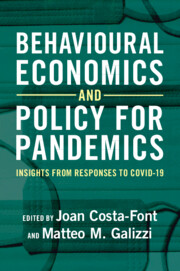Book contents
- Behavioural Economics and Policy for Pandemics
- Behavioural Economics and Policy for Pandemics
- Copyright page
- Epigraph
- Contents
- Contributors
- Preface
- Acknowledgements
- 1 Behavioural Economics and Policy for Pandemics
- Part I Evidence from Experiments and Behavioural Insights
- Part II Health Behaviours and Policies during Covid-19
- 14 The Effect of COVID-19 on Health and Health Behaviours
- 15 Mental Health and Health Behaviours among Vulnerable Populations during the COVID-19 Pandemic in the United States
- 16 Mental Health Interventions during the COVID-19 Pandemic
- 17 Wrinkles in a Pandemic?
- 18 Can Behavioural Insights Explain Ethnic Minority Vaccination Gaps?
- 19 How Can We Optimise Healthcare Delivery in the Wake of the COVID-19 Pandemic?
- 20 Biases in Vaccine Authorisation
- 21 Trust and the COVID-19 Pandemic
- 22 How Do Individuals Perceive the Risk of COVID-19 Compared to Food Poisoning and Influenza?
- Index
- References
20 - Biases in Vaccine Authorisation
Erring on the Side of Rare Events in SARS-CoV-2 Vaccines
from Part II - Health Behaviours and Policies during Covid-19
Published online by Cambridge University Press: 31 January 2025
- Behavioural Economics and Policy for Pandemics
- Behavioural Economics and Policy for Pandemics
- Copyright page
- Epigraph
- Contents
- Contributors
- Preface
- Acknowledgements
- 1 Behavioural Economics and Policy for Pandemics
- Part I Evidence from Experiments and Behavioural Insights
- Part II Health Behaviours and Policies during Covid-19
- 14 The Effect of COVID-19 on Health and Health Behaviours
- 15 Mental Health and Health Behaviours among Vulnerable Populations during the COVID-19 Pandemic in the United States
- 16 Mental Health Interventions during the COVID-19 Pandemic
- 17 Wrinkles in a Pandemic?
- 18 Can Behavioural Insights Explain Ethnic Minority Vaccination Gaps?
- 19 How Can We Optimise Healthcare Delivery in the Wake of the COVID-19 Pandemic?
- 20 Biases in Vaccine Authorisation
- 21 Trust and the COVID-19 Pandemic
- 22 How Do Individuals Perceive the Risk of COVID-19 Compared to Food Poisoning and Influenza?
- Index
- References
Summary
Decisions regarding the authorisation of new vaccines against SARS-CoV-2 have been highly heterogeneous across countries, resulting in significant regulatory misalignment regarding the vaccines approved for use in different countries. This chapter argues that such misalignment reflects an appeal to a version of the ‘precautionary principle’, which we define as ‘erring on the side of rare events’ (ESRE). This chapter discusses some cognitive biases that affect decision-making under risk, including the role of the media, especially the effect of social media. Finally, we provide a discussion of public reactions to ESRE and some conclusions and policy implications.
Keywords
- Type
- Chapter
- Information
- Behavioural Economics and Policy for PandemicsInsights from Responses to COVID-19, pp. 369 - 377Publisher: Cambridge University PressPrint publication year: 2024

